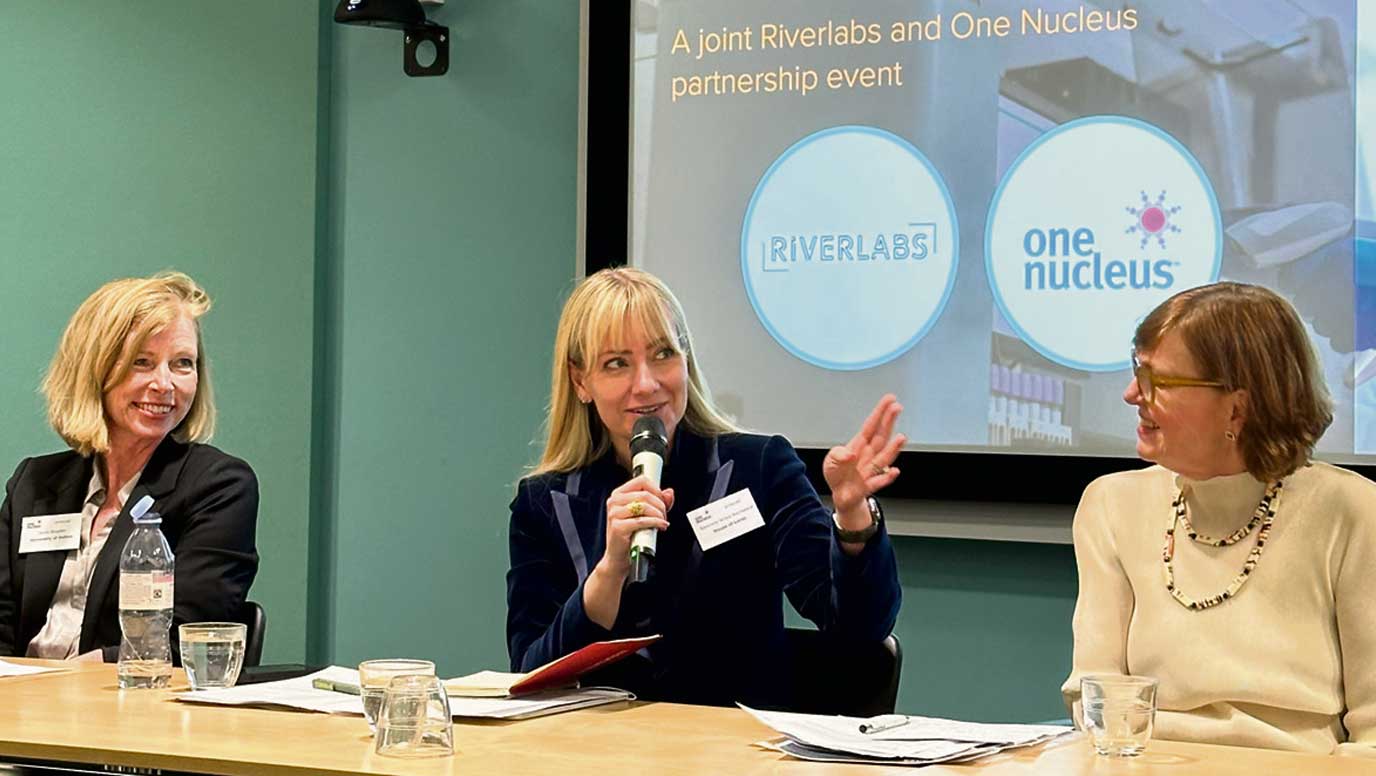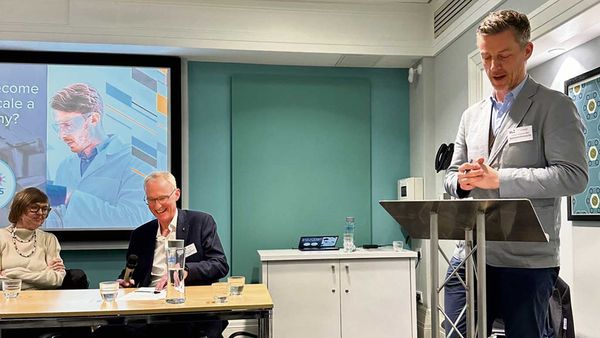How can the UK become the best place to scale a life science company?

In an event, hosted by Riverlabs and One Nucleus, a panel of leading life science experts and entrepreneurs came together at the Wellcome Collection to discuss what it would take to make the UK the best place in the world to scale a life science business.
The event, moderated by Lord O’Shaughnessy, also saw the former Minister of State for Science Technology & Innovation, George Freeman MP, give his first keynote speech since leaving office.
He set out the key challenges, opportunities and specific reforms required for the UK to tackle its weakness in life science scale-up. These included:-
• Speeding up access to market validation for innovation.
• A stronger global offer around bolder regulatory leadership with Testbeds for innovative new diagnostics and treatments.
• Stronger commitment to making the UK a global hub for skills and talent.
• Much stronger NHS commitment to clinical trials and research medicine (delivering on the vision of “every hospital a research hospital, every patient a research patient” in the original Life Science Vision).
• A package of tax incentives to encourage long term investment and scale-up finance in the City of London.
• Stronger integration of Health Innovation Clusters combining discovery and health economics.
“We need to better connect our tertiary research hospitals to their catchments and population base,” he said.

He went on to stress that whilst the UK is very strong in core science and has a strong ecosystem for drug discovery with biology, genomics and AI; and a much more mature angel base and pipeline of scale-up companies – the slow uptake of innovation and delivery of clinical trials by the NHS and the lack of a globally competitive regulatory and procurement framework risks global disinvestment.
The NHS needs to see and position itself as “the world’s largest platform for life science R & D and establish a new deal with the industry of low prices in return for faster access to patients and data.”
Cambridge was highlighted as a good example of a cluster ecosystem with Riverlabs acknowledged within the Golden Triangle thanks to its re-development of the former GSK site in Ware. The 28-acre site is currently undergoing an intelligent upgrade to create a vibrant, inclusive, open and highly sustainable campus and community.
Unlocked potential
The predominantly female panel included Baroness Blackwood, Chair of Genomics England, Chair of Oxford University Innovation and Board Member of BioNTech, and Professor of Experimental Oncology at University of Oxford and Founder of RNA Guardian Sarah Blagden.
Sitting alongside them were Cambridge Angels Chair Pam Garside and KQ Labs Chair and entrepreneur in residence at The Francis Crick Institute Barbara Domayne-Hayman. Autifony CEO Charles Large, who has enjoyed a decades-long career in big pharma, shared his perspective as a biotech founder.
While all speakers agreed that the sector is key for the UK with the potential to bring in billions of pounds, generate high growth in the economy and even rejuvenate the NHS, they acknowledged the barriers preventing this coming to fruition.
Barbara Domayne-Hayman lamented the fact that companies tend to sell out early in the UK and recounted her own experience with Arrow Therapeutics, which was sold to AstraZeneca in 2007 for $150m - while peers went on to sell later for $ billions: “Until we get over this sell early mindset, we’re not going to achieve the potential that we can. The investor mindset is to sell early, the minute an offer is on the table, the attitude is to take the money. There isn’t the confidence as there is in the US to take the risks and take it further.”
Pam Garside echoed this view: “There’s not enough ambition to build a big company. You go to the US and there’s enthusiasm and a bigger ambition generally.
“The venture capital industry in this country seems to be set in bioscience as find the asset, sell to pharma. We need longer term plans with an ecosystem of entrepreneurs who are more ambitious. The trend seems to be, build a company and then get out, not build a company for ten/fifteen years.”
Nurturing the talent pipeline
Other challenges faced by start-ups when it comes to scaling stem from being able to attract and retain talent, with issues around visa requirements for scientists coming from Europe raised as a specific barrier.
Charles Large felt a key focus should be on where the next tranche of biotech leaders will come from: “When I started Autifony 15 years ago, having spent two decades in big pharma, pretty much everyone had worked for GSK or Pfizer or AstraZeneca and all brought that experience with them. It’s not like that now.
“Where are they trained in drug development? Where are the places where these people are going to train to take these drugs to market? That’s an issue.”

The MHRA’s Innovative Licensing and Access Pathway was noted as having potential to make a big difference for early-stage companies who want to grow as it aims to accelerate the time to market by providing opportunities for enhanced regulatory input.
With an NHS background alongside clinical trial experience Sarah Blagden has a unique view of potential blockages for innovation. She believes there needs to be more enthusiasm in the NHS for research with proper accountability and cited the LungVax lung cancer prevention vaccine as an excellent example of how research can alleviate strain on the NHS.
“Entrepreneurship is a different world, and language, and there’s a lot of learning as you go along. I don’t think we encourage entrepreneurship as much as we should in universities and hospitals.
“Oxford’s better than most and virtually every senior researcher in my department has a spin-out or start-up but they all find it difficult to take their innovations into the NHS. We need to do more to attract and provide training and support for those who have the ambition and experience as well as the serial entrepreneurs who need reasons to stay in the UK and remain in the ecosystem.”
Rays of hope areas that are more promising include pension reform with the panel in agreement that if money is given to the right people who know what to do with it then it could unlock significant funding.
There was also positivity around the Enterprise Investment Scheme and Capital Gains Tax.
Baroness Blackwood believes there is plenty to be proud of in the UK life science sector, not least Genomics England which highlights the link between innovation, research and discovery and the benefit this has on clinical care.
She said: “We have no shortage of an innovation pipeline but creating an environment for those companies to flourish and scale is key for future success.”
Pam Garside agreed adding: “There are a few extraordinary ecosystems clustering universities, entrepreneurs and investors, and not just in the golden triangle of Oxford, Cambridge and London, but throughout the UK – we must nurture them.”
In summing up the panel discussion, Lord O’Shaughnessy concluded: “The word that’s come through most strongly is ambition. Ambition to build a big company, ambition to turn the NHS into a global R & D platform, ambition to create large funds to build even bigger science clusters, ambition to attract the best people from the UK and abroad and maybe a policy environment that’s ambitious to make all of this happen.”


